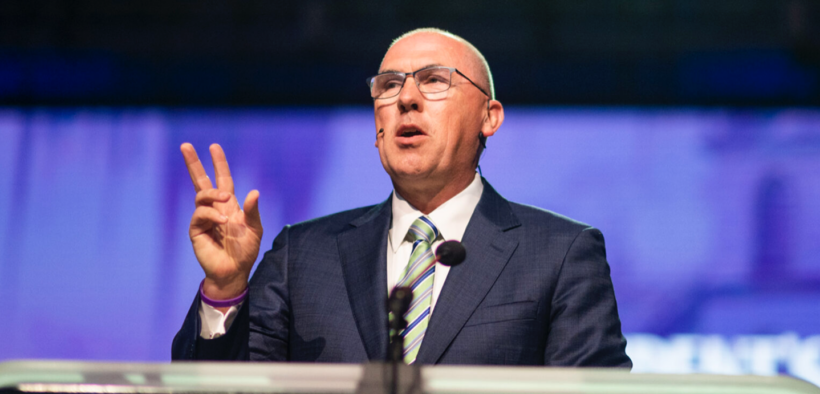SBC President Bart Barber Releases Statement Taking Responsibility for Amicus Brief

Southern Baptist Convention (SBC) President Bart Barber released a statement early Monday morning (Oct. 30) saying he takes “full responsibility” for the amicus brief that was submitted to the Kentucky Supreme Court on behalf of several SBC entities earlier this year.

SBC President Bart Barber / RNS photo by Emily Kask
The brief argued against statute of limitations reform for sexual abuse survivors attempting to sue non-perpetrating parties who failed to report abuse.
The amicus brief, which was reported by Andrew Wolfson of Louisville Courier Journal last week, was filed on a case that has no connection to the SBC, the Executive Committee (EC), Lifeway Christian Resources, and Southern Baptist Theological Seminary (SBTS). Nevertheless, all four entities were represented in the brief.
Barber, who is serving his second one-year term as the SBC president, said in his statement that he is glad he did not comment on the amicus brief as soon as he heard about it, adding that if he had, he would have said, “What are you talking about? I don’t know anything about any amicus brief.”
Barber went on to explain that while he initially didn’t remember signing off on the brief, he went back through his emails over the weekend and discovered he had done just that.
“This is my doing. I approved it. I take full responsibility for the SBC’s having joined this brief, and this lengthy statement will help to explain the mistakes I think I have made,” Barber said.
“In saying that, I know that a lot of people are disappointed with me and angry,” he added, continuing:
I’m talking about friends I’ve had for two decades. I’m talking about survivors of sexual abuse for whom I have wanted to be an advocate. I’m talking about people I myself appointed to carry forward the SBC’s response to the Guidepost Investigation. A lot of people—a lot of friends and allies—are really disappointed with me today. I don’t have words to express how I feel about that.
Barber explained that he signed off on the brief on Aug. 9, 2022, and shared how busy he was when he agreed to it.
“The day before, on August 8, 2022, I announced the appointment of the Abuse Reform Implementation Task Force,” Barber said. “That night I released a video responding to heated criticism I had received for appointing Todd Benkert to that committee.”
Access to MinistryWatch content is free. However, we hope you will support our work with your prayers and financial gifts. To make a donation, click here.
Barber then recalled that on Aug. 9, 2022, he attended an orientation for the new members of the SBC Executive Committee and said that he went from meeting to meeting all day—one of which included informing the Great Commission Council that the SBC was being investigated by the Department of Justice.
It was in the middle of that day that Barber said he received an email from the SBC’s legal team informing him of the amicus brief and recommending the SBC join it.
“It came at 1:30 PM, which was during the EC trustee orientation and a little more than two hours before I needed to lead that other meeting,” Barber remembered, adding, “The filing deadline was that day…so I had a little more than three hours to reply one way or the other.
Barber said that the conversation between him and the SBC lawyers was brief and strictly over email. “And the clock was ticking,” he said. “I became aware that the SBC Executive Committee was joining the brief. I approved our joining the brief. I hadn’t heard anything about it or thought anything about it since then until last Wednesday.”
Barber admitted that “legal work” hasn’t been his “favorite part” of serving as the SBC president and said that he can’t recall his exact thoughts the day he read the brief.
“I did not know the circumstances of the underlying legal case. I do, however, know what has been my consistent practice in addressing these legal matters,” he said, “so I am very confident that I was reading that brief asking myself the question, ‘Is this an honest, true legal question for which the Southern Baptist Convention can take this position in good faith?’”
“What was I thinking?” Barber asked. “I was thinking about THAT question. I did what I did because of the answer to that question.”
Having become familiar with the case behind the SBC’s amicus brief, a case that centers on Samantha Killary, who was sexually abused as a child by her adoptive father, Louisville Police Officer Sean Jackman, Barber said he can’t stop thinking about her.
“What have I communicated to her and to other survivors by taking this action,” he said. “Those questions can give clarity when legal questions are difficult to sort out. And some of the legal questions in play certainly are difficult to sort out.”
“I am not sure exactly what I think about statutes of limitation. I think they are a mixed bag. I may not know for sure what I think about statutes of limitations, but I know for sure what I believe about preventing clergy sexual abuse,” Barber continued. “I know for sure what I believe about reporting suspected sexual abuse every time, right away. I know exactly what I believe about how sexual misconduct disqualifies people from pastoral ministry.”
Barber confessed that he certainly “did not give this decision to file this brief the level of consideration that it deserved.”
“Some of the most important information affecting my decision was information I failed to seek,” Barber continued. “Knowing what I know now, I know that I should have asked more questions. I should have taken the opportunity to request a meeting between the Interim CEO, myself, and our legal counsel to gather more information.”
“I hope to do a better job of using my voice to influence those decisions going forward,” Barber said.
Barber expressed that when he signed off on the amicus brief, he was not thinking, “How can I harm survivors of sexual abuse today?” To illustrate, he pointed out that on the same day, he spent his time “appointing people like Marshall Blalock and Todd Benkert, both of whom have publicly expressed disapproval of this brief.”
“I wasn’t appointing Todd or Marshall out of one hand while trying to thwart their efforts out of the other. I know that for sure,” he added. “I spent that day trying to support everyone on the Abuse Reform Implementation Task Force (ARITF) and to carry forward our work. August 9, 2022, was not a day I spent trying to hurt survivors.”
Expressing his disappointment with himself, Barber admitted that his actions ended up “hurting survivors.” And although his determination “to advance abuse reform in the SBC is no less than it was when” he began, he understands that his credibility with survivors “is harmed by this, perhaps irreparably.”
In conclusion, Barber asked for prayer, saying, “I am counting on your prayers and I am counting on wisdom from above. I hope that I learn a little with every mistake that I make, and I hope that those of you who are angry with me today can find it in your hearts to forgive me.”
This article was originally published by ChurchLeaders.



